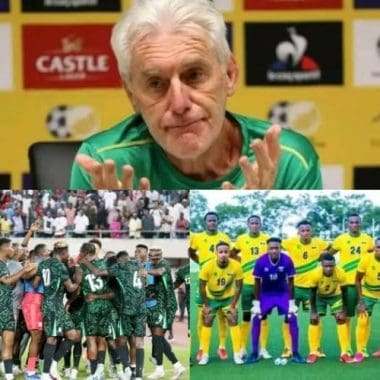Bafana Bafana coach Hugo Broos has declared South Africa deserves World Cup qualification more than Nigeria, expressing unwavering confidence as his team prepares for crucial final qualifiers against Zimbabwe and Rwanda that could secure their place at the 2026 tournament in North America.
The South African senior men’s national team assembled in Roodepoort, Johannesburg, on Monday morning ahead of their upcoming matches. They face Zimbabwe at Moses Mabhida Stadium in Durban on Friday, October 10, 2025, before hosting Rwanda at Mbombela Stadium, Mpumalanga, on Tuesday, October 14, 2025. Both matches kick off at 6:00 PM local time.
“There are no doubts, there have never been any doubts from my side, and I will try to transfer this to the players at a meeting we will have on Tuesday,” Broos stated. “I believe in this group and I am sure that they will do everything in their power to win that game on Friday.”
His most pointed comment directly compared South Africa’s qualification credentials to Nigeria’s. “Why should we doubt ourselves now after our performances in the qualifiers? If there is a team that deserves to go to the World Cup, it is South Africa,” he declared.
The statement carries particular edge given the competitive dynamics in CAF Group C, where South Africa and Nigeria have been battling for the single automatic qualification spot. South Africa drew 1-1 with Nigeria in their most recent encounter on September 9, 2025, a result that strengthened Bafana Bafana’s position.
South Africa currently leads Group C with 11 points from eight matches, putting them in control of their qualification destiny. They will qualify automatically if they win both remaining games against Zimbabwe and Rwanda, making Broos’s confidence mathematically grounded rather than merely rhetorical.
However, complications exist. South Africa are yet to learn if there will be any punishment for playing an ineligible player in a 2-0 victory over Lesotho in March, which could become a 3-0 loss if FIFA rules against them. Such a reversal would dramatically alter the group standings and potentially hand the advantage to rivals.
Nigeria, three-time African champions, sit third in the group but remain mathematically alive. Benin also harbors qualification hopes, though they face two difficult away games in Rwanda and Nigeria that make their path significantly more challenging than South Africa’s.
Broos’s assertion that South Africa deserves qualification “more than Nigeria” reflects confidence in his team’s qualifying campaign performance rather than suggesting Nigeria lacks merit. His comments emphasize consistency over reputation, a subtle dig at Nigeria’s historical dominance in African football.
The Belgian coach has transformed South Africa’s fortunes since taking charge. Bafana Bafana have shown improved organization, tactical discipline, and mental resilience compared to previous qualifying campaigns where they often faltered in crucial moments.
Zimbabwe presents a tricky opening challenge despite their lower group standing. Away qualifiers in African football rarely follow form predictions, with underdog teams frequently rising to occasions against stronger opponents, particularly when hosting neighbors.
Rwanda, meanwhile, defeated Zimbabwe 1-0 in September, demonstrating they pose genuine threats despite being eliminated from qualification contention. Teams with nothing to lose sometimes play with freedom that makes them dangerous opponents.
South Africa’s home advantage for both matches cannot be understated. Bafana Bafana are unbeaten at home in these qualifiers, creating fortress-like conditions that have contributed significantly to their strong group position.
The Moses Mabhida Stadium in Durban provides an atmospheric venue for the Zimbabwe clash, while Mbombela Stadium offers another hostile environment for visiting teams. South African fans have created intimidating atmospheres that have influenced several qualifying results.
For Nigeria, watching these matches unfold brings uncomfortable scenarios. The Super Eagles must win their own fixtures while hoping South Africa drops points, a combination that grows increasingly unlikely given current form trajectories.
Broos’s comments also reflect broader narratives about African football hierarchies. Nigeria historically dominates continental competition and qualification campaigns, making South Africa’s current superiority in their group a notable reversal of traditional power dynamics.
Whether South Africa ultimately qualifies depends on execution rather than deserving status. Football rewards teams that win crucial matches, not those with most compelling narratives or strongest claims about merit.
The pressure now falls squarely on Broos and his players to convert confidence into results. Bold declarations before crucial qualifiers either become validation or embarrassment depending on outcomes, making the next week decisive for South African football.
If South Africa succeeds, they will join the 2026 World Cup in Canada, Mexico, and the United States, marking their first qualification since 2010 when they hosted the tournament. That extended absence makes current qualification hopes particularly meaningful for South African football.
For Broos, successfully guiding South Africa to World Cup qualification would cement his legacy and validate his methods. Failure, conversely, would make his confident pre-match declarations appear premature and potentially damage his credibility.
Source: newsghana.com.gh











